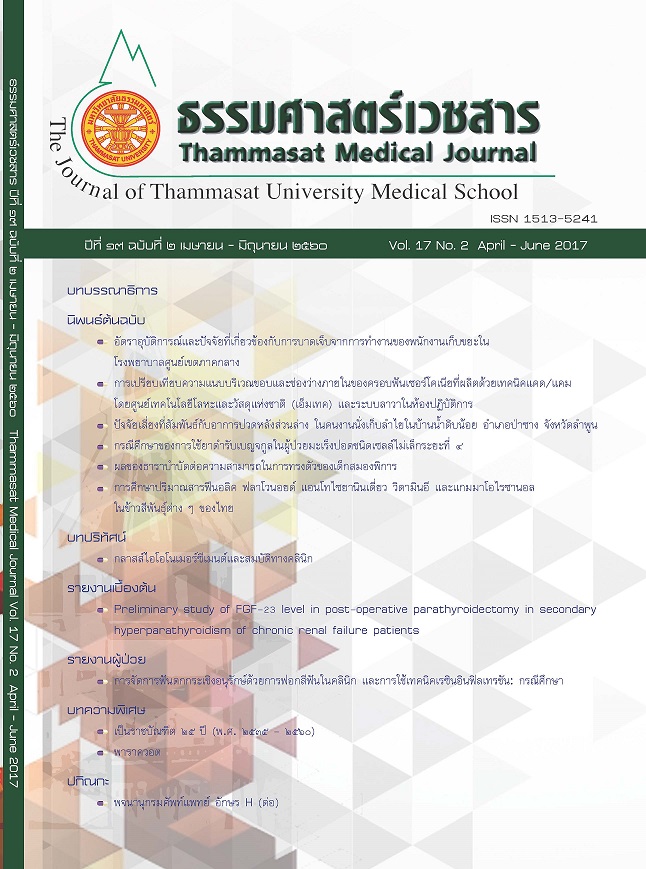Case studies of Benjakul recipes in treating stage 4 non – small cell lung cancer
Keywords:
ยาตำรับเบญจกูล, มะเร็งปอดชนิดเซลล์ไม่เล็กระยะที่ 4, คุณภาพชีวิต, Benjakul recipe, Stage 4 non – small cell lung cancer, Quality of lifeAbstract
Introduction: Benjakul is an elemental remedy consisting of five types of herb; Piper chaba fruits, Piper sarmentosum root, Piper rostratum stem, Plumbago indica root, and Zingiber officinale rhizome, weighted by the fixed-ratio (1:1:1:1:1). From selective interviews of folk healers in Southern Thailand, it was used as an adaptogenic drug for cancer patients. Objective was to study the effectiveness and safety of patients with stage 4 non-small cell lung cancer treated with Benjakul recipe.
Method: A volunteer patient who met the inclusion criteria, received 2 capsules of 100 mg of benjakul recipe 3 times daily for 6 months and stopping of other drugs or treatments was required. The patient was followed up by interviewing, physical examination, laboratory testing and quality of life assessment before and every 4 weeks during treatment.
Result: A patient who received our treatment was a 52-year-old male with a diagnosis of stage 4 non-small cell lung cancer (NSCLC). He received the benjakul drug for 5.9 months, but stopped the drug after that because the disease was progresses. After taking Benjakul recipe, the results showed that the O2 saturation level was in normal range and renal function was no toxicity. But the liver function (only AST and ALP levels), the lipid profile (cholesterol, triglyceride, LDL-cholesterol, HDL-cholesterol) and neutrophil level were increased. Moreover, sweating and feeling hot after taking the Benjakul drug were reported as adverse events. However, the objective response rate was evaluated as stable disease for 5.9 months, and changed to progressive disease after that. Additional, the Thai-modified Function Living Index Cancer questionnaire version 2 (T-FLIC2), showed good improvement of quality of life of the patient from “good” to “very good” statement.
Discussion and Conclusion: This study showed that taking the Benjakul recipe capsule for 5.9 months in stage 4 non-small lung cancer patient had less systemic side effects and improvement their quality of life. So, Benjakul recipe will be a good alternative choice for end stage non-small cell lung cancer patient.
บทนำ: ในทางการแพทย์แผนไทยใช้ยาตำรับเบญจกูลเป็นยาปรับธาตุซึ่งประกอบด้วยสมุนไพร ๕ ชนิดคือ ผลดีปลีรากช้าพลู เถาสะค้าน รากเจตมูลเพลิงแดง และเหง้าขิง ในอัตราส่วน ๑:๑:๑:๑:๑ จากการสำรวจการใช้ของหมอพื้นบ้านภาคใต้ พบว่ามีการใช้ตำรับเบญจกูลเพื่อปรับสมดุลของธาตุในร่างกายก่อนการรักษาด้วยตำรับยามะเร็ง วัตถุประสงค์เพื่อศึกษาประสิทธิผลและความปลอดภัยในผู้ป่วยมะเร็งปอดชนิดเซลล์ไม่เล็กระยะที่ ๔ ที่ได้รับการรักษาด้วยตำรับยาเบญจกูล
วิธีการศึกษา: อาสาสมัครที่มีคุณสมบัติตรงตามเกณฑ์การคัดเข้าจะได้รับยาตำรับเบญจกูลในขนาด ๑๐๐ มิลลิกรัมต่อแคปซูลโดยรับประทานครั้งละ ๒ เม็ด วันละ ๓ ครั้ง เป็นระยะเวลา ๖ เดือน โดยไม่ได้รับประทานร่วมกับยาอื่น หรือได้รับการรักษาโดยวิธีอื่นใด ติดตามและประเมินผลด้วยการซักประวัติ ตรวจร่างกาย การตรวจทางห้องปฏิบัติการและคุณภาพชีวิต ก่อนรักษาและระหว่างการรักษาทุก ๔ สัปดาห์
ผลการศึกษา: อาสาสมัคร ๑ คน เพศชาย อายุ ๕๒ ปี ได้รับการวินิจฉัยเป็นมะเร็งปอดชนิดเซลล์ไม่เล็กระยะที่ ๔ อาสาสมัครรับประทานยาเป็นเวลา ๕.๙ เดือน และหยุดยาเนื่องจากโรคกำเริบ จากการศึกษาพบว่าหลังรับประทานยาตำรับเบญจกูลค่าความเข้มข้นของออกซิเจนในกระแสเลือด และค่าการทำงานของไตอยู่ในเกณฑ์ปรกติ ยกเว้นค่าเอนไซม์ตับ (เฉพาะค่า AST และ ALP) ค่าไขมันในเลือด (เฉพาะค่า cholesterol, triglyceride, LDL-cholesterol, HDL-cholesterol) และความสมบูรณ์ของเม็ดเลือดเฉพาะค่า neutrophil มีแนวโน้มสูงขึ้นเล็กน้อย อาสาสมัครมีอาการเหงื่อออกและรู้สึกร้อนหลังรับประทานยา อัตราการตอบสนองต่อยาของอาสาสมัครอยู่ในระยะคงที่ของโรคถึง ๕.๙ เดือน และเปลี่ยนเป็นระยะโรคกำเริบในเวลาต่อมา คุณภาพชีวิตจากการประเมินโดยใช้ T-FLIC version 2 หลังเข้าร่วมโครงการเปลี่ยนจากระดับดี เป็นดีมาก
วิจารณ์ และสรุปผลการศึกษา: การรับประทานยาตำรับเบญจกูลเป็นระยะเวลา ๕.๙ เดือน ในผู้ป่วยมะเร็งปอดชนิดเซลล์ไม่เล็กระยะที่ ๔ พบว่า การตอบสนองเป็นแบบ stable disease ไม่พบผลข้างเคียงที่รุนแรง และช่วยให้อาสาสมัครมีคุณภาพชีวิตที่ดีขึ้น ดังนั้นยาตำรับเบญจกูลจึงเป็นอีกทางเลือกหนึ่งที่น่าจะปลอดภัยในการดูแลผู้ป่วยมะเร็งปอดชนิดเซลล์ไม่เล็กระยะสุดท้าย


